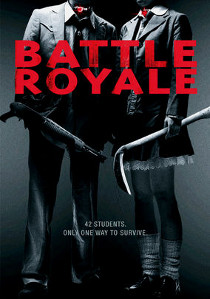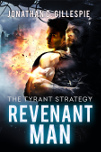Review: Battle Royale
December 7, 2012 in General Topics
 Way back when I first heard of The Hunger Games, two films popped into my head. The first was the Arnold Schwarzenegger-starring adapation of the novel The Running Man, by “Richard Bachman” (who was revealed years ago to be a pen name of Stephen King’s). Widely viewed in the United States, it orbited my childhood. I sought it out due to my love of science fiction.
Way back when I first heard of The Hunger Games, two films popped into my head. The first was the Arnold Schwarzenegger-starring adapation of the novel The Running Man, by “Richard Bachman” (who was revealed years ago to be a pen name of Stephen King’s). Widely viewed in the United States, it orbited my childhood. I sought it out due to my love of science fiction.
The second film slammed like a comet into the firmament of my adulthood. It presented no one-liners, no outrageous costumes or hulking action stars. None of the characters really won–they just lost less. The ending was starkly and typically Japanese, leaving its loose ends unresolved in the way that great cinema often does. That film was Battle Royale.
Having viewed the film adaptation of The Hunger Games recently, I felt compelled to revisit Battle Royale and see if it still help up. This presented a problem.
That problem is one common to foreign films that don’t fit the linear nature of American cinema: people can’t leave them alone. The version I saw on Netflix was different from the one I’d seen years ago. The ending was altered, various scenes were cut or inserted, and–as always–someone redid the subtitling, yet again. On the upside, this version did strike me as an improvement.
I digress. The movie centers on a dystopian Japan, populated by adults disgusted at the way the youth no longer respects their elders. Schools have become anarchic environments. In an attempt to remind the kids of their proper place, the government transports a randomly-selected class off to a remote location every year, and forces them to fight to the death until one child remains.
I’m going to resist the obvious comparisons to The Hunger Games, because I don’t believe anyone owns tropes.
Anyway, the kids are each given duffel bags, containing randomly-selected utilitarian items–such as binoculars or megaphones–or weapons. They’re all fitted with explosive collars that can be remote-activated, too. They’re given simple instructions: kill, or be killed. The last boy or girl breathing is the “winner”.
The film’s chosen class contains Shuya Nanahara (Tatsuya Fujiwara), a young man struggling after his father’s recent suicide, and Noriko Nakagawa (Aki Maeda), a straight-laced young woman who has attracted special interest from the film’s main antagonist, a former teacher, turned military mastermind, named Kitano (Takeshi Kitano). In addition to these kids, we have a cross-section of your typical high school cliques. There’s a “gang” of bullies. A cluster of geeks. The “class slut”. The jock. Popular kids. Punks.
Kids, kids, kids, all of them.
To ensure things roll along, two “transfer” students are added to the mix–one a silent villain, the other a determined enigma. Both dramatically outclass the other kids in experience and cunning. And both will be central to the plot.
Soon the film is off and running, with one death coming after another, as the carefully constructed social strata and hierarchy common to a high school class comes undone. Some of the students go insane. Others try to force themselves on their classmates, sometimes sexually, abandoning reason in exchange for a new frontier of id-equipped havoc. In this, the film pays homage to Lord of the Flies.
The narrative jumps from one set of kids to another so often that it can be challenging to keep up. In particular, I still find it nigh-impossible to track all the romantic connections. But the movie’s stark violence carries with it moments of personal tragedy, as one by one the classmates whittle down and Kitano-Sensei’s own demons come to light. Nothing will be resolved like you want it to be. I adore that.
Because that’s how war is: preconception and bravado fades in the face of unflinching, uncaring random odds. You can counter chance to some degree, especially with preparation, but you can never truly control the fickle nature of combat and its consequences.
There’s so much Battle Royale gets right, like perfect cinematography and excellent casting (particularly in the case of Kitano), that it’s hard to find anything wrong. I mentioned the pacing; the film takes its time at spots, and some viewers might be put off by that. I wasn’t.
And then there’s the graphic violence. Again, this is something that might repel a watcher, but I found the bloodshed as necessary as the violence found in a film like Schindler’s List. The gore is here to make a point. Interestingly, when I dug up the Wikipedia article, I noted the film’s late director, Kinji Fukasaku, was an ardent opponent of war. The novel’s writer and Fukasaku certainly chose a fertile, stark sandbox in which to spin a tale about the evils of armed conflict.
Battle Royale isn’t for everyone. But it was absolutely for me.
Class dismissed.
4.5/5 Stars.

Recent Discussion